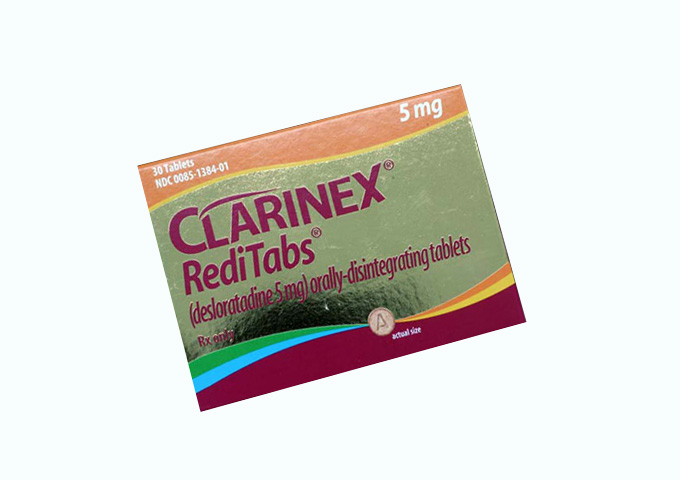Clarinex (Desloratadine)
Clarinex is an anti-histamine compound used to relieve the symptoms of hay fever, i.e. runny nose, sneezing, watering or itching eyes. Medicament is also used to treat hives and itching of the skin.
Uses
The main active ingredient, desloratadine, works by blocking the action of histamine, a substance in the body that triggers allergic reactions. Here are the common uses of Clarinex:
- Allergic Rhinitis: Clarinex is primarily prescribed to treat symptoms associated with allergic rhinitis, which includes seasonal allergies (hay fever) and perennial allergies (year-round). It helps relieve symptoms such as sneezing, runny or stuffy nose, itching, and watery eyes.
- Chronic Idiopathic Urticaria: Medicine is also used to manage chronic idiopathic urticaria, a skin condition characterized by the development of itchy hives or welts on the skin without a known cause.
It's important to note that drug is not a cure for allergies or chronic idiopathic urticaria; it only provides relief from the symptoms. Always follow your doctor's instructions and the prescribed dosage when using Clarinex or any other medication.

Dosage
The dosage of Clarinex may vary depending on the individual's age, medical condition, and the form of the medication (e.g., tablet, syrup, or orally disintegrating tablet). It's crucial to follow the specific dosing instructions provided on the medication's label. Here are some general guidelines for the usual dosages of this drug:
For Allergic Rhinitis (Seasonal and Perennial Allergies):
- Adults and children 12 years of age and older: The typical recommended dose is 5 mg once daily.
- Children aged 6 to 11 years: The usual dose is 2.5 mg (½ tablet) once daily.
For Chronic Idiopathic Urticaria:
- Adults and children 12 years of age and older: The standard recommended dose is 5 mg once daily.
- Children aged 6 to 11 years: The usual dose is 2.5 mg (½ tablet) once daily.
If you have liver or kidney problems, the dose may need to be adjusted accordingly.
What if I miss a dose?
If a dose is missed, you may take it as soon as possible. Thereafter, revert to your regular dosing schedule. You should not take a double dose.
Overdose
An overdose of Clarinex occurs when a person takes more than the prescribed or recommended dose, significantly exceeding the normal therapeutic range. If you suspect an overdose or someone you know may have taken too much Clarinex, it is crucial to seek immediate medical attention or contact a poison control center.
Symptoms of overdose may include:
- Severe drowsiness or sedation
- Rapid heartbeat or palpitations
- Difficulty breathing
- Tremors or shaking
- Unusual restlessness or nervousness
- Hallucinations or confusion
- Fainting or loss of consciousness
- Nausea and vomiting
In case of an overdose, do not attempt to treat the situation at home or induce vomiting without medical supervision. Instead, contact emergency services or the local poison control center immediately.
The management of an overdose may involve supportive care to treat symptoms and close monitoring of the individual's vital signs. In some cases, activated charcoal may be administered in the hospital to help absorb the excess medication in the digestive system. Medical professionals will take appropriate measures to ensure the person's safety and recovery.
What precautions should I take while using Clarinex?
When using Clarinex, there are several precautions and considerations you should be aware of to ensure safe and effective use of the medication. Here are some important precautions to keep in mind:
- Alcohol: Avoid consuming alcohol while taking Clarinex, as it can increase drowsiness and impair your ability to perform certain tasks.
- Driving and Operating Machinery: Medicine may cause drowsiness or impair your ability to concentrate. If you experience these effects, avoid driving, operating heavy machinery, or engaging in activities that require mental alertness until you know how the medication affects you.
- Overdose: Taking more than the prescribed dose of pharmaceutical product can lead to an overdose. If you suspect an overdose or experience severe symptoms like difficulty breathing or loss of consciousness, seek immediate medical attention or contact a poison control center.
- Age Considerations: The safety and effectiveness of Clarinex in children under 6 years of age have not been established, so it is generally not recommended for use in this age group.
Side Effects
Like any medication, Clarinex may cause side effects, although not everyone experiences them. Common side effects are usually mild and may include:
- Headache
- Dry mouth
- Fatigue or drowsiness
- Upset stomach or nausea
- Sore throat
- Muscle pain
- Diarrhea
- Menstrual pain or cramps (in some females)
These side effects are generally temporary and may improve as your body adjusts to the medication.
In some cases, more severe side effects can occur, although they are less common. If you experience any of the following serious side effects, seek immediate medical attention:
- Allergic reactions: Signs of an allergic reaction may include rash, itching, swelling (especially of the face, tongue, or throat), severe dizziness, or difficulty breathing.
- Rapid or irregular heartbeat: If you experience a fast or irregular heartbeat, chest pain, or fainting, seek medical attention promptly.
- Unusual mood changes or mental/mood changes: Some individuals may experience mood swings, hallucinations, or agitation.
- Yellowing of the skin or eyes (jaundice): This may indicate a serious liver problem.
- Seizures: In rare cases, Clarinex may trigger seizures in susceptible individuals.
It's important to remember that not everyone will experience these side effects, and many people tolerate Clarinex well.
Storage
Proper storage of Clarinex is essential to maintain the medication's effectiveness and safety. Here are some general guidelines for storing pills:
- Temperature: Store tablets at room temperature, typically between 68°F to 77°F (20°C to 25°C). Avoid exposing the medication to extreme heat or cold.
- Moisture: Keep the medication in its original packaging, and protect it from excessive moisture. Do not store Clarinex in the bathroom, where humidity levels are higher.
- Light: Keep tablets away from direct sunlight and sources of intense light.
- Child Safety: Store Clarinex out of reach of children and pets to prevent accidental ingestion.
- Disposal: If you have any expired or unused tablets or syrup, consult your local guidelines or pharmacist on the proper disposal method. Do not flush medications down the toilet or drain unless instructed to do so.
- Original Packaging: Keep medicine in its original container with the label intact for easy identification and dosage instructions.
Always check the specific storage instructions provided on the medication's label or package insert.
Additionally, it's essential to check the expiration date of Clarinex regularly. Do not use the medication after the expiration date has passed, as its effectiveness and safety may be compromised.
By following these storage guidelines, you can help ensure that Clarinex remains stable and effective for its intended use.
